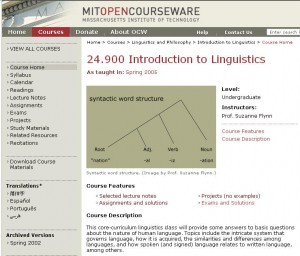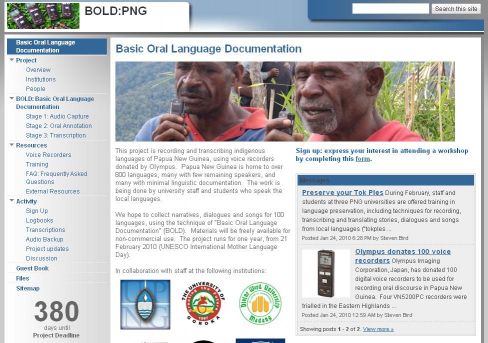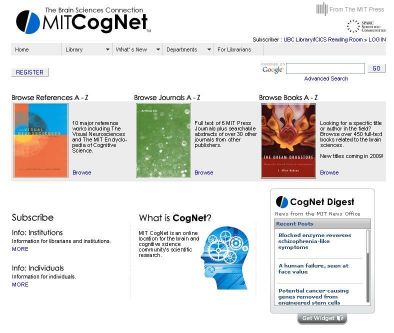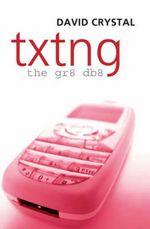March 31st, 2010 by Susan Atkey | No Comments »

Looking for practice sample sets for Linguistics classes? Check out MIT’s OpenCourseWare website.
MIT’s Department of Linguistics and Philosophy has made available a number of their course materials ranging from introductory classes to graduate seminars. The material available varies widely – sometimes you get just get an outline of the course and selected lecture notes, but in other cases you get sample assignments and exams (with and without solutions), problem sets, complete lecture notes, and audiovisual materials.
Courses with course materials include:
Click here for the full list of courses.
To read more about the history and philosophy behind the MITOpenCourseware project, visit the OCW Project about page.
Posted in Assignments, Tips and Tricks, What's New? | No Comments »
March 17th, 2010 by Susan Atkey | No Comments »
There’s still room in today’s workshop on Current Awareness Tools.
Here’s the blurb:
Save valuable research time! Online research resources offer an array of tools to help you stay current in your field. In this workshop you’ll learn how to set up email alerts and RSS feeds to:
- be notified when new articles and dissertations are published on your topic
- receive Table of Contents for the latest issue of your favorite journal
- find out when new books in your discipline have arrived in the library
- be notified of funding and upcoming conference opportunities
- follow news stories and blogs
No matter what your discipline, you’ll leave the session having set up a number of alerts to stay up-to-date with your research interests!
Date and Time: Wednesday, March 17th from 11:00am – 12:30pm
Location: Koerner Library, room 217 (map)
Register here: http://elred.library.ubc.ca/libs/dashboard/view/679
Posted in Workshops and Tutorials | No Comments »
February 18th, 2010 by Susan Atkey | No Comments »
February 21st marks UNESCO’s International Mother Language Day. IMLD has been observed yearly since February 2000 to promote linguistic and cultural diversity and multilingualism.
IMLD originated as the international recognition of Bangladesh’s Language Movement Day, which has been commemorated in Bangladesh since 1952 following government attempts in 1948 to make Urdu the sole national language and thereby angering the Bengali-speaking majority of East Pakistan. Anger and discontent peaked in 1952 when protesting students at the University of Dhaka were killed at a protest on 21 February.
Bengali was recognised as the second official language of Pakistan on February 29, 1956, and the constitution of Pakistan was reworded to “The state language of Pakistan shall be Urdu and Bengali.”
For more on the topic of the Bengali Language Movement, the 2008 book State language movement in East Bengal, 1947-1956 by A.M.A Muhith takes a comprehensive look at the issues. Tariq Rahman’s Language and politics in Pakistan (1996) looks at other political and cultural aspects of language in Pakistan,with chapters on British Language Policies and Imperialism; Pashto Language Movement; Urdu-Hindi Controversy; Language Movements of Balochistan, and more. Both of these titles are available at Koerner Library.
If you just want a summary, the Wikipedia entry on the Bangladesh Language Movement provides a good starting point; check out the list of citations at the end for more articles, newspaper reports, and more.
Posted in Uncategorized | No Comments »
February 5th, 2010 by Susan Atkey | 1 Comment »
A fascinating new language documentation project gets under way next week. The BOLD:PNG project (Basic Oral Language Documentation : Papua New Guinea) involves training university students and literacy teachers to collect and curate oral texts from native speakers of the 830 indigenous languages of Papua New Guinea, many of which are at risk of disappearing.

As the overview page for the site points out, this type of work has been done by linguists for years, however, this painstaking individual work can’t keep pace with the rate of language loss. The BOLD-PNG project addresses the problem of scale by training university students and literacy teachers to collect language data from native speakers over the course of the one-year project using voice recorders donated by Olympus.
For more on languages of New Guinea, check out the entries on New Guinea Languages, Papuan Tip Languages and North New Guinea Languages in the International Encyclopedia of Linguistics, available online to UBC folks. The language lists in the entries on Papuan Tip Languages and North New Guinea Languages also include location and approximate number of remaining speakers.
We have a number of books on Papuan languages in Koerner, including a key text called Papuan languages of New Guinea by William Foley (part of the Cambridge language surveys).
Good luck to all involved in the project!
Posted in Uncategorized | 1 Comment »
January 20th, 2010 by Susan Atkey | No Comments »
Just noticed a number of new books on African languages which have arrived in Koerner Library:
We have a strong collection of materials on African languages and linguistics. If you want to search the library catalogue for more, this Guide to Subject Headings, Classification, and Call Numbers for African Languages will help get you started.
If you’d like to browse the stacks to see what’s available, the call number ranges are below. The majority of the collection is in Koerner Library; some material is housed in the ASRS (storage).
PL8000-8844 African languages and literature
PL8000-8009 Languages
PL8009.5-8014 Literature
PL8015-8021 Languages. By region or country
PL8024-8027 Special families of languages
PL8035-8844 Special languages (alphabetically)
Posted in Uncategorized | No Comments »
March 27th, 2009 by Susan Atkey | No Comments »

UBC Library has just subscribed to a new database of interest to Linguists – MIT CogNet.
MIT CogNet provides online access to resources from several fields, such as artificial intelligence, linguistics, neuroscience, psychology, philosophy and education.
The platform provides an ever-growing electronic collection of relevant books, journals, conference proceedings, calls for papers and grey literature, and provides searchable access to ten major reference works published by the MIT Press.
The information page for CogNet is at:
http://toby.library.ubc.ca/resources/infopage.cfm?id=1517
Browse the list of eBooks here:
http://cognet.mit.edu/library/books/
Posted in Electronic Resources | No Comments »
December 1st, 2008 by Susan Atkey | No Comments »

(Photo credit: ccarlstead)
Winter session exams begin on December 3 and go until December 17. The Linguistics exam schedule is here.
Did you know the AMS has an exam database with final exams from a variety of undergrad courses? Studying from previous years’ exams can be a great way to supplement your course knowledge and prepare for finals. Currently, the database has exams for these Linguistics courses:
- LING 310
- LING 316
- LING 317
- LING 319
Posted in Tips and Tricks | No Comments »
November 28th, 2008 by Susan Atkey | No Comments »

Txtng : the Gr8 Db8 by David Crystal
“Do young people text as much as people think? Do adults? Does texting spell the end of literacy? Is there a panic in the media? David Crystal looks at the evidence. He investigates how texting began and who uses it, why and what for. He shows how to interpret its mix of pictograms, logograms, abbreviations, symbols, and wordplay, and how it works in different languages. He explores the ways similar devices have been used in different eras and discovers that the texting system of conveying sounds and meaning goes back a long way, all the way in fact to the origins of writing – and he concludes that far from hindering literacy, texting may turn out to help it.”
[Oxford University Press]
Posted in What's New? | No Comments »
November 17th, 2008 by Susan Atkey | No Comments »
A reminder of an upcoming workshop of interest to MA and PhD students:
Phinished! How to Access Completed Dissertations & Theses
Wondering what a PHinisheD dissertation looks like? We now have access to tens of thousands of dissertations online from universities throughout North America and beyond. Learn to search for dissertations completed at UBC and elsewhere by program, topic or advisor. Then download the full text. We’ll use this guide: FAQ: Dissertations and Theses. And we’ll look at the website www.phinished.org for a bit of practical advice.
Wed 19 Nov 2008
12:30 PM – 2:00 PM
Koerner Library : Room 217
The session is free, but sign up here.
Posted in Workshops and Tutorials | No Comments »
November 10th, 2008 by Susan Atkey | No Comments »

You’ve likely heard about RefWorks, the online citation management tool that allows you to save references for your research paper from online databases such as AnthropologyPlus and Google Scholar, and then formats your paper in the citation style of your choice. Perhaps you’ve had a chance to get started with RefWorks, but need some help in using its many features.
This Wednesday is your chance to find out more! Come to Koerner Library for a RefWorks session from 10:00am-312:00pm.
Workshop is free, but please register here.
Posted in Workshops and Tutorials | No Comments »






